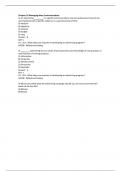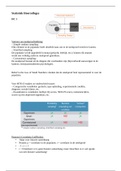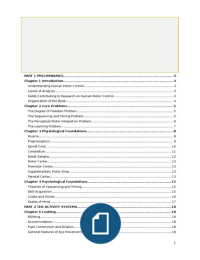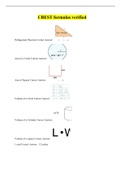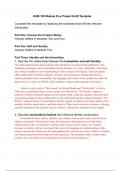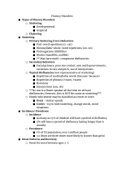Management Control Papers summary week 3
Dechow & Sloan 1991
This paper investigated the hypothesis the CEOs in their final year of office, manage
discretionary investment expenditures to improve short-term earnings performance.
The following hypotheses are used for this research;
1. Ceteris paribus, reductions in expenditures on R&D activities are more likely during
the years immediately prior to a CEO’s departure.
2. Ceteris paribus, reductions in R&D expenditures during the years immediately prior
to a CEO’s departure are less likely if the CEO’s wealth is sensitive to firm value.
3. Ceteris paribus, reductions in R&D expenditures during the years immediately prior
to a CEO’s departure are less likely if the relay process of a CEO succession is used.
The results suggest that CEOs spend less on R&D in their final year of office in order to
improve results, which could be because R&D is an intangible asset and thus shows more
risk. But in addition, the researchers found that two mechanisms can be identified that
mitigate the incentives of executives to reduce R&D expenditures.
1. The provision of stock-price-based incentives. The more stock and options the
executives own, the less likely they are to reduce discretionary expenditures prior
to their departure.
2. Relay process of CEO succession. (let successor walk with current CEO for something
like three years)
Additional tests indicate that the reductions in R&D and advertisement expenditures are not
associate with either poor firm performance or reductions in investment expenditures that
are capitalized for accounting purposes. Capital investments do not go down because it is
capitalized and depreciated so which is why it does not hit the balance sheet. The evidence
supports the hypothesis that earnings-based incentives encourage executives to focus on
short-term performance. However, while the researchers found that R&D expenditures are
reduced during CEO’s final year of office, they also found that there is an increase during the
incoming CEO’s first year of office. Thus, the reductions in R&D expenditures during CEO’s
final years may largely reflect the delay of investment expenditures rather than the loss of
real investment opportunities.
Wallace 1997
This paper investigated whether managers of firms adopting compensation contracts with
residual income-based performance measures take actions consistent with the incentives
that are associated with these measures. In other words, what actions do managers
undertake to get the residual income as high as possible. To test this, the researcher formed
the following hypotheses;
1. Ceteris paribus, asset dispositions will increase and new investment will decrease for
firms following the adoption of a residual income-based compensation plan, relative
to firms where the manager is evaluated and compensated based on traditional
earnings measures.
a. Asset dispositions deflate by beginning of year total assets
b. New investment
Dechow & Sloan 1991
This paper investigated the hypothesis the CEOs in their final year of office, manage
discretionary investment expenditures to improve short-term earnings performance.
The following hypotheses are used for this research;
1. Ceteris paribus, reductions in expenditures on R&D activities are more likely during
the years immediately prior to a CEO’s departure.
2. Ceteris paribus, reductions in R&D expenditures during the years immediately prior
to a CEO’s departure are less likely if the CEO’s wealth is sensitive to firm value.
3. Ceteris paribus, reductions in R&D expenditures during the years immediately prior
to a CEO’s departure are less likely if the relay process of a CEO succession is used.
The results suggest that CEOs spend less on R&D in their final year of office in order to
improve results, which could be because R&D is an intangible asset and thus shows more
risk. But in addition, the researchers found that two mechanisms can be identified that
mitigate the incentives of executives to reduce R&D expenditures.
1. The provision of stock-price-based incentives. The more stock and options the
executives own, the less likely they are to reduce discretionary expenditures prior
to their departure.
2. Relay process of CEO succession. (let successor walk with current CEO for something
like three years)
Additional tests indicate that the reductions in R&D and advertisement expenditures are not
associate with either poor firm performance or reductions in investment expenditures that
are capitalized for accounting purposes. Capital investments do not go down because it is
capitalized and depreciated so which is why it does not hit the balance sheet. The evidence
supports the hypothesis that earnings-based incentives encourage executives to focus on
short-term performance. However, while the researchers found that R&D expenditures are
reduced during CEO’s final year of office, they also found that there is an increase during the
incoming CEO’s first year of office. Thus, the reductions in R&D expenditures during CEO’s
final years may largely reflect the delay of investment expenditures rather than the loss of
real investment opportunities.
Wallace 1997
This paper investigated whether managers of firms adopting compensation contracts with
residual income-based performance measures take actions consistent with the incentives
that are associated with these measures. In other words, what actions do managers
undertake to get the residual income as high as possible. To test this, the researcher formed
the following hypotheses;
1. Ceteris paribus, asset dispositions will increase and new investment will decrease for
firms following the adoption of a residual income-based compensation plan, relative
to firms where the manager is evaluated and compensated based on traditional
earnings measures.
a. Asset dispositions deflate by beginning of year total assets
b. New investment


